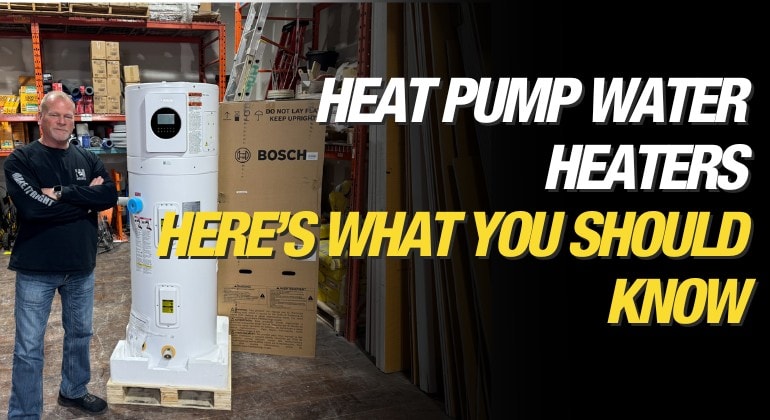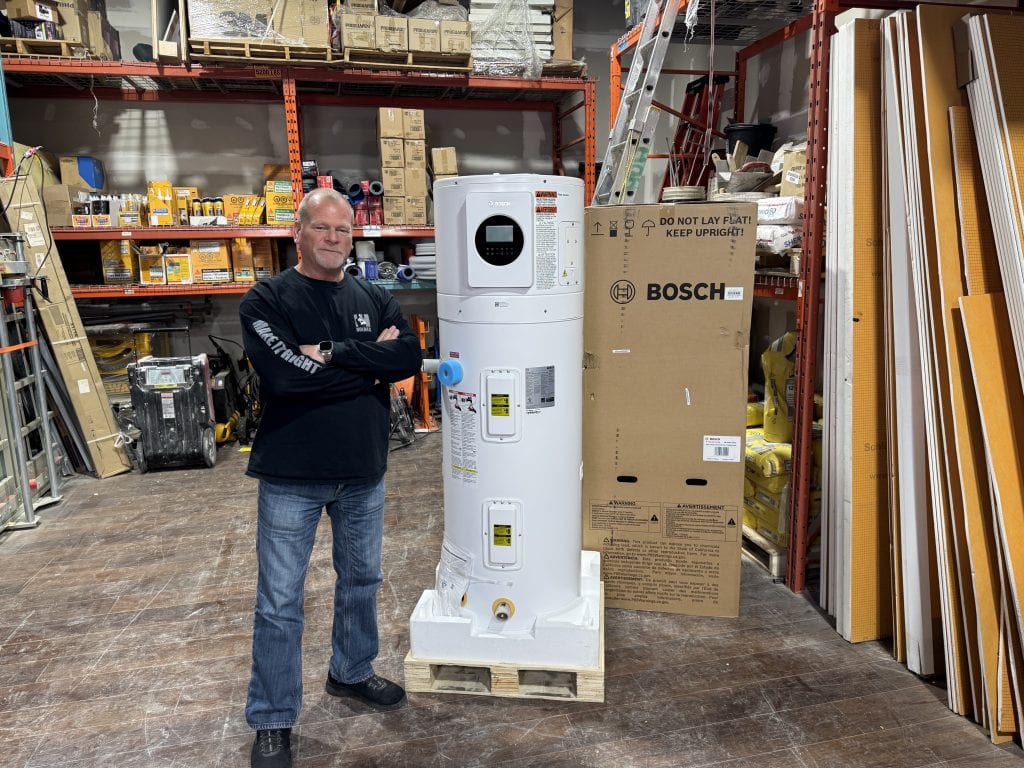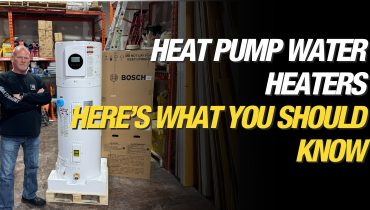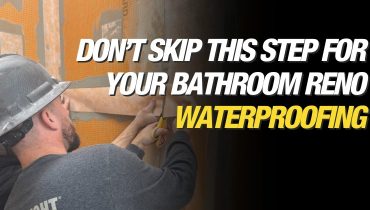Is a Heat Pump Water Heater Right for You? Water heaters are one of the biggest energy users in a home, so choosing the right one can make a huge...

Heat Pump Water Heater Installation: What You Need to Know
By Mike Holmes
Mike’s Advice /
Monday, April 7th, 2025 @ 12:41pm
Is a Heat Pump Water Heater Right for You?
Water heaters are one of the biggest energy users in a home, so choosing the right one can make a huge difference in both performance and cost savings. If you’re looking for a more efficient way to heat water without sacrificing comfort, a heat pump water heater (also known as hybrid water heaters) could be the perfect solution.
I first came across this technology at the AHR EXPO in 2024, where I got a closer look at how Bosch’s heat pump water heaters works —and I was seriously impressed.
Unlike traditional water heaters that generate heat, heat pump water heaters pull warmth from the surrounding air to heat the water in the tank. That means they use way less energy, making them one of the most efficient water heating options available today.
But like any home upgrade, a heat pump water heater isn’t the right fit for every home. Before you install one, there are a few things you need to know—from space requirements to energy savings—so you can make the best choice for your home.
Here’s what you need to know about heat pump water heaters (also known as hybrid water heaters).
How To Choose A Heat Pump Water Heater?
Choosing the ideal heat pump water heater depends on factors such as household size, budget, energy efficiency, and available installation space. Here’s a detailed guide to assist you in making the best choice.
Consider Your Home’s Hot Water Needs
Before choosing a unit, consider your household’s hot water usage. Heat pump water heaters come in different tank sizes.
So if your family frequently runs hot multiple showers, laundry, and the dishwasher at the same time, you’ll want to opt for a larger capacity model.
Look at Energy Efficiency Ratings:
Heat pump water heaters are among the most efficient on the market, with UEF (Uniform Energy Factor) ratings ranging from 2.0 to 4.0 compared to 0.9 for traditional electric water heaters.
The higher values indicate better efficiency, and models with ENERGY STAR® certification provide the best efficiency and savings.
Check Noise Levels:
Heat pump water heaters make a low humming sound, similar to a refrigerator. If noise is a concern, choose a model with quiet operation features in the 45-55 decibel range.
The Bosch GreenTronic 7000 which we’ve installed on some of our projects has a quiet operation at just 49 dB(A). This is very low comparable to a quiet refrigerator, so you won’t even know it’s running.
Check Installation Requirements:
Since heat pump water heaters rely on airflow, they need adequate space to function efficiently. However, the good news is they use standard power and water connections, making them a relatively simple upgrade for most homes.
You will also need to confirm with a licensed electrician to ensure your current electrical panel and service can handle new appliances like a heat pump water heater.
What I love about the Bosch GreenTronic 7000 is that the water connections on the left and electrical on the right means that plumbers and electricians can work simultaneously for faster install time. Also it can be installed in a corner since there are no connections on the back.
Unlike traditional water heaters that generate heat, heat pump water heaters pull warmth from the surrounding air to heat the water in the tank. That means they use way less energy, making them one of the most efficient water heating options available today.
Look for Additional Features:
Some models offer multiple operation modes, including:
- Heat Pump Mode (maximum efficiency)
- Hybrid Mode (a balance of efficiency and performance)
- Electric Mode (for faster heating when needed)
- Vacation Mode (reduces energy use when away)
I love when companies think one step ahead. The Bosch GreenTronic 7000 has back-up heating elements available for when faster heat-up times are needed. Great for busy households with multi-generations living under one roof.
Another great feature of the Bosch GreenTronic 7000 is that it can be bought with an auto shutoff leak protection kit (sold separately). This can detect leaks and will shut off the supply of water to your water heater. Brilliant!
Look for Warranty and Customer Support
One key consideration when choosing your heat pump water heater is the warranty offered by the manufacturer. A solid warranty can provide peace of mind, protecting you from potential repair costs down the road.
Look for models with a longer warranty period on both the tank and components. Many reputable brands, including Bosch, offer 10-year limited warranties on their units, giving homeowners confidence in the durability and longevity of the system.
Ask About Rebates & Incentives:
Many local utility companies and manufacturers offer rebates or tax incentives for installing an energy-efficient water heater.
Check out the Bosch Home Comfort link to find rebates and incentives in your area to see what’s available.
Cost vs. Savings: Is a Heat Pump Water Heater Worth It?
One of the first questions homeowners ask is: Are heat pump water heaters really worth the cost? And the answer is yes—but you have to look at the long-term savings.
A heat pump water heater does cost more upfront than a traditional electric model, but it can cut energy bills by up to 60%. Over time, those savings add up, making it a smart investment for homeowners who want to lower their energy costs and reduce their carbon footprint.
Plus, many rebates and incentives are available to help offset the initial cost, making it even more affordable.
Where Should You Install a Heat Pump Water Heater?
Picking the right location is essential for maximizing efficiency and performance from your heat pump water heater. Unlike standard units, HPWHs draw air from their surroundings to function effectively, so they require adequate airflow and space to operate properly.
The best places for installing these systems are basements, garages, and utility rooms—anywhere that has stable temperatures and room for air circulation. If space is a concern, the Bosch GreenTronic 7000 provides optional duct adapters that allow for flexible airflow and installation, making it easier to fit in a variety of locations.
However, keep in mind that even with this flexibility, it’s still important to ensure the unit has enough ventilation to operate efficiently. If you’re planning to install the system in a small, enclosed space, such as a closet, it might not perform as well, even with the duct adapters.
Additionally, if you live in a cold climate, you may still need a backup heating source to ensure consistent hot water during colder months.
Do I Need To Hire A Professional For The Heat Pump Water Heater Installation?
When it comes to installing a heat pump water heater, I’m the first to tell you: leave it to the pros. Now, I’ve been in the construction business for decades, and I know a thing or two about installations. But when it comes to HVAC, even I don’t take any chances. Getting a manufacturer-certified professional—like a Bosch Home Comfort Pro—is the best way to ensure the job gets done right.
A heat pump water heater is more than just plumbing—it involves careful planning, specific knowledge of electrical systems, and making sure everything works together seamlessly.
Here Are Some Of The Benefits Of Leaving The Installation To The Pros
- Sizing the Right Unit for Your Home: An expert will assess your home’s layout and hot water needs to select the right-sized water heater. Installing the wrong size can lead to wasted energy or inadequate hot water supply.
- Plumbing & Electrical Work: Improper installation can lead to leaks, flooding, or even electrical hazards.
- Building Codes & Permits: A licensed professional ensures the installation meets local building codes and avoids potential legal issues.
- Maximizing Efficiency: A pro will ensure your water heater is installed correctly for optimal energy efficiency, saving you money on utility bills.
Why You Need To Consult With a Licensed Electrician?
Now, here’s something many homeowners overlook: electrical compatibility. It’s important that your home’s electrical panel is prepared to handle the load of a heat pump water heater.
While this might seem like a small detail, skipping this step could result in unexpected expenses—a panel upgrade, for example, can be a costly fix if it’s overlooked before installation. By getting a professional electrician involved early, you’ll avoid unnecessary headaches down the road.
Trust me, doing this the right way from the start will save you time, money, and a lot of frustration. By investing in the right installation experts, you’ll ensure that your new heat pump water heater runs smoothly and provides the long-term savings you’re looking for. It’s always worth doing things the right way from the get-go.
How to Maintain a Heat Pump Water Heater for Best Performance
Generally most heat pump water heaters require an annual maintenance service check by a pro. Though some manufacturers recommend the first service inspection at the 6 month mark on a new system. Also, many new models today have programmable capabilities that allow for reminders and alerts notifying homeowners of issues so they can be addressed immediately.
Other maintenance tips include:
- Regular filter cleaning to maintain good airflow
- Check for proper airflow and drainage
- Flush tank to remove any sediment buildup
- Check for leaks and listen for unusual noises
Signs That Your Hybrid Water Heater May Need Service
With regular inspections, draining, and flushing, a gas water heater should last 8 to 12 years, while an electric water heater should last 10 to 15 years. However, your old water heater may be showing signs of service or even replacing if the following occur:
- It’s taking longer to heat-up than normal
- Strange or loud noises are coming from the unit
- Water isn’t heating properly regardless of temperature settings
If you’re looking for a smarter, more efficient way to heat water, a heat pump water heater is worth considering. With lower energy costs, modern features, and long-term savings, it’s a great investment for homeowners who want to reduce their carbon footprint while still getting reliable hot water.
READ NEXT: Gas Tankless Water Heaters – Here’s What You Should Know
FAQs: Heat Pump Water Heaters
How does a heat pump water heater work?
A heat pump water heater absorbs heat from the surrounding air and transfers it to the water tank, making it far more energy-efficient than a traditional electric model.
Are heat pump water heaters worth the investment?
Yes! While they have higher upfront costs, they can cut energy bills by up to 60%, making them a smart long-term investment.
Can a heat pump water heater work in cold climates?
Yes, but it may need a backup heating element in colder regions to maintain performance.
How long does a heat pump water heater last?
With proper maintenance, most models last 10-15 years, outlasting standard electric water heaters.
What rebates are available for heat pump water heaters?
Many federal, state, and local programs offer rebates and tax incentives for installing an energy-efficient water heater. Check with Bosch Home Comfort or your local energy provider for details.





